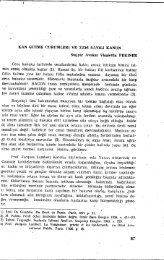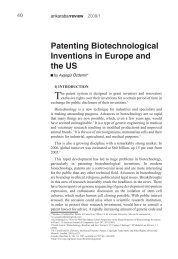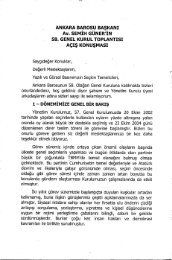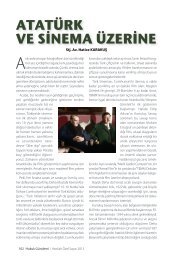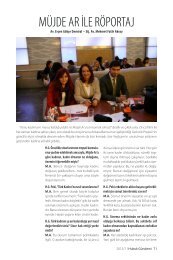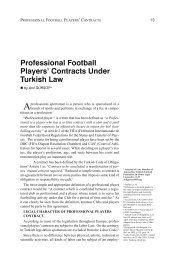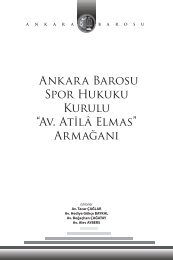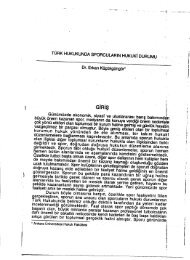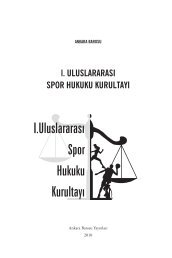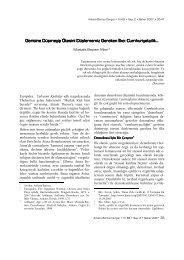The Turkish Cypriot Legal System from a Historical ... - Ankara Barosu
The Turkish Cypriot Legal System from a Historical ... - Ankara Barosu
The Turkish Cypriot Legal System from a Historical ... - Ankara Barosu
Create successful ePaper yourself
Turn your PDF publications into a flip-book with our unique Google optimized e-Paper software.
<strong>The</strong> TuRkish CypRioT legal sysTem fRom a hisToRiCal peRspeCTiVe<br />
and criminal cases, except those falling within the exclusive competence<br />
of the Islamic Courts (Şeri’ye) and the Community (Cemaat)<br />
Courts, i.e. guardianship, alimony, cancellation and/or nullity of marriage<br />
and divorce cases 56 .<br />
<strong>The</strong> above mentioned legal system was adopted and applied in Cyprus<br />
until 1882, when the British administration went for some major<br />
changes by broadening the area of jurisdiction of regional courts,<br />
which restricted the power of Şer’iye courts considerably. 57 Moreover,<br />
within the same period of time, for disputes stemming <strong>from</strong> family law<br />
issues, which had previously been heard by the High Court as a court<br />
of first instance, regional courts were held to be competent, and it was<br />
decided that for those disputes the High Court would only be acting as<br />
the court of appeal. 58 <strong>The</strong> intention of British administrators to make<br />
the applicable law more “British” on the island soon showed itself also<br />
in the law that had been applied to “Greek- Orthodox” community<br />
during the Ottoman Era. In this context, the power of Greek Community<br />
Courts was limited to the cases of guardianship and adoption,<br />
by empowering the regional courts on all other cases. This system remained<br />
until the establishment of RoC. 59<br />
2. <strong>Cypriot</strong> <strong>Legal</strong> <strong>System</strong> in the “Late British Era (1914-1960)”<br />
<strong>The</strong> years between 1914 and 1960 were the years when the British<br />
administration undertook legal and administrative moves to maintain<br />
its existence on the island permanently. 60 In those years, the British<br />
both wanted to restructure the judicial councils permanently throughout<br />
the island and to reshape the community with the new substantive<br />
law provisions, and thereby maintain their existence on the island<br />
permanently. For instance, the laws like the Protection of the Plaintiffs<br />
Code, the Mutual Recognition of the Foreign Court Judgments<br />
Code, the Implementation of the Alimony Orders, the Oaths Code, the<br />
Limitation of Action Code, the Testimony Code, the Criminal Procedure<br />
Code, the Civil Procedures Code, the Justice Courts Code, were<br />
the most important laws in the field of procedural law enacted by the<br />
British Administration. Similarly, the Marriage Code, the Maritime<br />
Code, the Working Hours Code, the Policy Code, the Bankruptcy<br />
Code, the Municipalities Code, the tax laws like the Real Property<br />
Tax, the Income Tax, the Torts Code, the Contracts Code, the Tax Collection<br />
Code, the Real Property Acquiring Code, the Inheritance Code,<br />
the laws on the education such as the Elementary Education, Secondary<br />
Education, the British School, the laws such as the Trade Unions<br />
56 NEOCLEOUS, p. 12.<br />
57 An, pp. 87-88.<br />
58 NEOCLEOUS, p. 11.<br />
59 NEOCLEOUS, p. 11.<br />
60 For the preliminary transactions of the British administration for to be permanent in the island and reactions <strong>from</strong><br />
Greek and <strong>Turkish</strong> communities towards those transactions, please see GAZİOĞLU, (Enosis Çemberi), p. 41 et seq.;<br />
UÇAROL, p. 154 et seq.<br />
103




